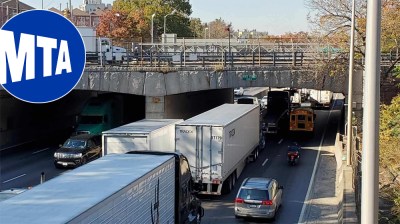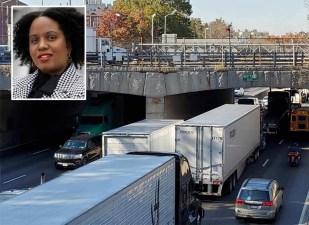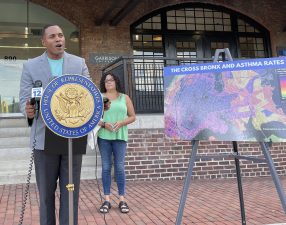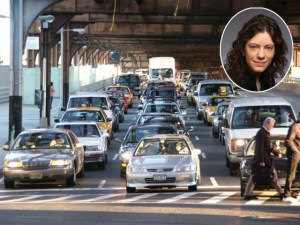‘Gridlock’ Sam: Give Truckers Credits So Congestion Toll Doesn’t Add to Bronx Pollution
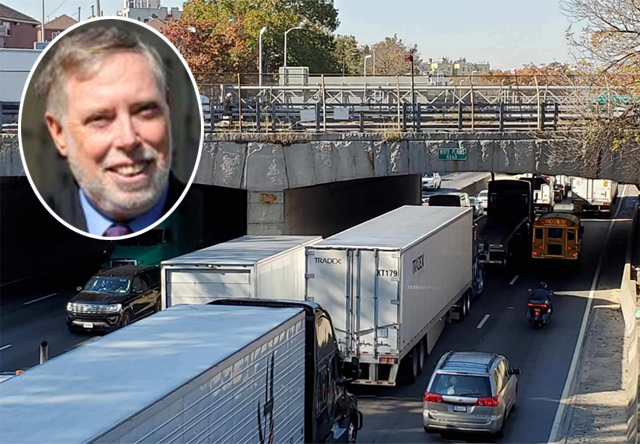
Perhaps toll credits will fix this impasse.
Longtime congestion pricing proponent and former New York City Traffic Commissioner “Gridlock” Sam Schwartz says that the city and state should give truck drivers a financial incentive to not cut through the Bronx in an effort to avoid the new tolls.
A slight increase in truck traffic in The Bronx is one of the potential negative impacts of congestion pricing, the MTA revealed in its environmental assessment, but the numbers of trucks — at most 700 to the 27,000-a-day volume — can be solved, experts say.
“The only way congestion pricing would send trucks to the Cross Bronx is if the congestion charge exceeded current tolls,” said Schwartz. “Setting the truck rate to be equal to, or less than, that at MTA bridges between Queens and the Bronx would minimize any diversions.”
Under Schwartz’s thinking, truck tolls shouldn’t be more than 2.2 times higher than whatever the toll is for private cars, which under the various congestion pricing scenarios range from $9 to $23 for peak-hour tolls.
“There is little to no demand for trucks shifting from the CBD if a credit is given at the Lincoln Tunnel. The opposite is more likely, albeit very small in number, due to improved traffic speeds in the CBD,” he said.
The MTA has modeled a pair of scenarios in which truck drivers are given credits for either just the tunnels into and out of Manhattan, or for the tunnels and over every bridge north of the congestion zone. The amount of trucks predicted to cut through the Bronx in the four scenarios where some kind of credit is given for trucks are all lower than the prediction in Scenario A, known as the base plan, in which no credits or exemptions are given out.

But according to Schwartz, there are still increases in truck traffic in the scenarios with credits because large trucks are still tolled between $42 and $82. At those prices, truck drivers aren’t incentivized to drive through Manhattan, even if they would deal with slightly less traffic on the trip.
Eastbound truck drivers currently pay $44 at the Lincoln Tunnel when heading into the city, and an additional $18 if they choose to take the Queens Midtown Tunnel instead of the Queensboro Bridge. Meanwhile, westbound truck drivers headed to New Jersey through Manhattan pay $18 if they go through the Queens Midtown Tunnel and nothing at the Lincoln Tunnel, potentially giving truckers more of an incentive to avoid a full toll in a world with congestion pricing. On a westbound trip through the Bronx, a driver would pay an $18 toll on the Triborough Bridge, Whitestone Bridge or Throgs Neck Bridge and then an additional $4 toll on the New Jersey Turnpike to avoid the toll, for a total of $22.
Advocates for the congestion toll are grappling with what to do to ensure that a predicted increase in truck traffic on the Cross Bronx Expressway doesn’t come to pass when congestion pricing begins as early as January 2024. Among the seven scenarios the MTA modeled for congestion pricing, only the scenario in which trucks are tolled at the same rate as private cars results in fewer than 100 additional trucks onto the Cross Bronx Expressway every day.
Rep. Ritchie Torres, who represents the South Bronx in Congress, has said that he supports congestion pricing, but can’t support a scenario that sends any more trucks into the Bronx. In a recent Daily News op-ed, Torres echoed Schwartz’s proposal, writing, “Trucks should get a full credit when using the Lincoln Tunnel or Midtown Tunnel to enter the Central Business District so that there is no cash incentive to divert to the Cross Bronx.”
Torres and Schwartz, however, are only on the sidelines. If the federal government gives a final blessing to congestion pricing, the Traffic Mobility Review Board, an entirely new body, will develop the toll recommendations and exemptions. At least one member of the TMRB said she’s not eager to hand out any exemptions.
“I wouldn’t want to say I’m a ‘No’ on this because I haven’t talked to Sam and heard his pitch,” said Kathy Wylde, the president of the Partnership for New York City and a member of the TMRB. “My initial reaction is I would rather increase fees on the Cross Bronx than give more discounts in the congestion pricing district.
“Anything that reduces the impact of the congestion pricing zone is going to make it less effective and less attractive,” Wylde added. “It’s not just a matter of raising more money. It’s a matter of people seeing a real improvement in the city as a result of reducing excess congestion.”
A toll on the Cross Bronx would require an entirely new environmental review in hopes of getting federal approval, however.
